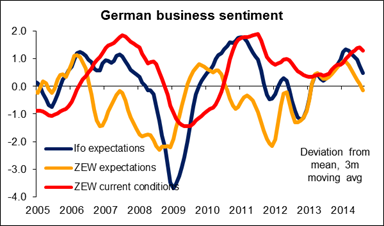Cautiousness ahead of Fed The dollar tried to rally yesterday but weak data from China and below-forecast industrial production from the US caused investors to question what the FOMC would do on Wednesday. The mood was compounded by new growth forecasts from the OECD that were substantially lower than they were back in May. With questions about the Fed creeping in, EUR/USD failed to make a new low for the year and USD/JPY failed to make a new high. The question is whether the FOMC meeting brings forward the expected time of tightening or not. I would argue that it is likely to, as the weighted average of the “dot plot” forecasts for the Fed funds rate are likely to move higher. Some people are even looking for the FOMC to drop calendar-based guidance from its statement, that is, to remove the line about rates remaining low for “a considerable time” after the end of QE (although I wouldn’t expect such a change until it’s absolutely necessary, which will be next month). But any impact from such changes could be offset by dovish comments from Chair Yellen in the subsequent press conference. In any case, there’s plenty of room for volatility tomorrow.
Scotland: I said yesterday that I thought it would be a mistake for Scotland to declare independence. That view is based solely on economics, primarily currency economics. The problem is that the UK has ruled out a currency union with Scotland. That means if the new country keeps the pound, as its leaders have said it would, it would simply be a passive taker of UK monetary policy. So if everything goes right, they would find their monetary policy determined for them in London without their having any say in the matter. And as we’ve learned from the Eurozone crisis, countries with similar monetary policies have to have similar fiscal policies. In sum, they would cede control of the major levers of their economy in return for..what? A flag? A seat at the UN? And if things didn’t go well for them, if for example Spain vetoed their joining the EU: disaster.
A “yes” vote would also have grave implications for the Eurozone. It would make it more likely that Britain withdraws from the EU after the referendum in 2017. It would also encourage other independence-minded areas, such as Catalonia in Spain, to pursue their dream. And if Scottish voters can decide to leave a 300-year-old union, then disgruntled voters throughout the region may be encouraged to leave the much-younger Eurozone. Just look at the increased votes that anti-establishment parties got over the weekend in both Sweden and Germany. Indeed, it may not be too much to say that a “yes” vote could start people around the world reconsidering just what the role of the nation-state is nowadays and whether they are best served as part of a larger group or whether they should rely more on their tribal group. Calling Kerala?
Australia: The Reserve Bank of Australia (RBA) released the minutes of its September policy meeting. There was no change in its assessment of the currency (”above most estimates of its fundamental value, particularly given the declines in key commodity prices”) and so there was little impact on AUD.
Today: The German ZEW survey for September is the main indicator due out during the European day. The current situation and the expectations indices are both expected to decline, reflecting the impact of the Russian tit-for-tat sanctions and the high degree of uncertainty and geopolitical risks faced by the region. That could put downward pressure on EUR/USD.

In the UK, the forecast for the August CPI is for the inflation rate to slow to 1.5% yoy from 1.6% yoy, a low level last seen in May and before that, in 2009. The slowdown in inflation would likely keep the GBP under selling pressure before the Sept. 18 Scotland’s independence referendum as it makes a rate hike somewhat less likely.
From the US, we get PPI for August and from Canada, manufacturing sales for July are coming out.
We have three speakers on Tuesday’s agenda. Bank of Japan Governor Haruhiko Kuroda, ECB Governing Council member Erkki Liikanen and Bank of Canada Governor Stephen Poloz speak. Poloz’s speech could be market-affecting. His topic is “The role of a floating exchange rate in the Canadian economy and in the Bank’s policy framework” and the speech is followed by a press conference.
